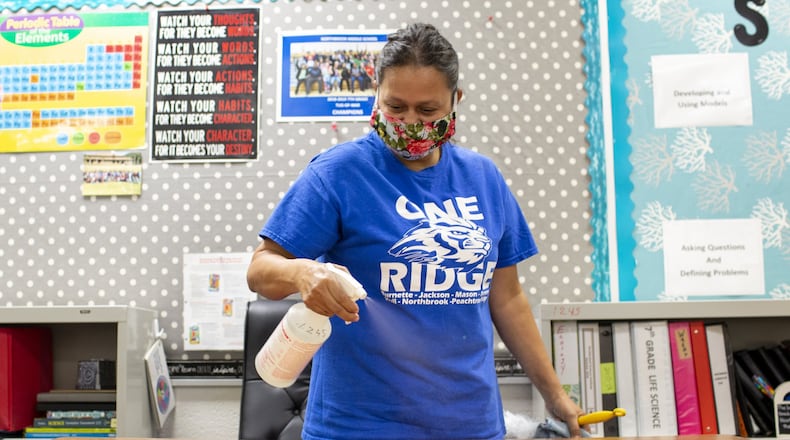School leaders in Georgia are trying to settle on plans for the fall as pressure mounts to reopen school buildings.
Working parents rely on schools to keep their children engaged so they can do their own jobs, and many parents and teachers say remote learning last spring after schools shut down for COVID-19 left learning gaps.
Yet with coronavirus infection case numbers on the rise nationally and in Georgia, many are also worried about the risks of infection and school districts are caught in the middle. The added strain of budget cuts and enrollment uncertainty has school systems weighing options of in-school and at-home learning or something in between.
On Wednesday, President Donald Trump increased the pressure, calling on districts to return students to the classroom or risk loss of federal tax dollars.
Florida's education commissioner on Monday ordered public schools there to reopen, but so far Georgia Gov. Brian Kemp has made no similar mandates.
Richard Woods, the elected state school superintendent who works closely with Kemp, said local leaders are in the best position to make their own decisions. “The effects of the pandemic have not been identical in every community,” he said through a spokesperson. “While it’s my belief that most school districts will be able to reopen safely this fall with precautions in place, I also believe local boards of education should have the flexibility to be responsive to the needs of their communities and the feedback they’re receiving from parents, teachers, and staff members.”
The American Academy of Pediatrics is calling on schools to bring kids back in-person, too, but only if they can do it safely. Schools provide social and emotional skills, healthy meals, exercise and mental health support and can address racial and social inequity, Sara “Sally” Goza, the Georgia doctor who is president of the group, said in a statement Wednesday. Children tend to get infected less, to suffer less extreme symptoms and are less likely to transmit the virus, so the benefits outweigh the risks, she said.
Goza pushed back, though, on efforts to force schools to open.
>> RELATED | Trump threatens he may ‘cut off funding’ if schools don't reopen
“It’s unfortunate that our guidance is being politicized by some and misinterpreted to mean a universal return to school no matter what,” she wrote. “Schools will need new resources to keep students, teachers and staff safe. I am very concerned by recent statements from federal leaders threatening to withhold federal funds from schools that do not pursue in-person reopening in the fall.”
Teachers are also worried. In a new statewide survey, roughly 1 in 5 said they were unlikely to return to school to teach in person. The most frequently cited reason was concern about infection, said Margaret Ciccarelli, director of legislative services for the Professional Association of Georgia Educators, which did the survey of roughly 16,000 educators.
Nearly half indicated that they felt their school district safety plans didn’t adequately address the risk, she added, and in many cases the plans weren’t even available.
And even those with reopening plans are having to be flexible as the pandemic changes the fall outlook.
Clayton County appears to have one of the most detailed plans set to launch. In a virtual presentation Tuesday, Superintendent Morcease Beasley explained four options: all in-person, all virtual, a hybrid of both and a separate academy for virtual learning.
Last month Beasley said he was leaning toward starting the first day of school in person, but the infection rate of the virus has increased so much it looks like the July 28 final decision will be all-virtual.
“The rate is worse right now than it was on March 15 when we went into quarantine,” Beasley said.
Many back-to-school plans offer in-person or virtual learning only. It’s unclear how many families will select the online option, but two of Georgia’s 180 school districts say they’ve seen little interest.
Nearly a third of parents who answered a survey in Calhoun, about 70 miles north of Atlanta, earlier this spring said they were uncomfortable sending their kids in person, but so far only 3% of the district’s more than 4,000 students have signed up to go online instead of to regular classrooms, Superintendent Michele Taylor said. Parents have until July 31 to choose between the online or in-person options.
Amy Dees, chair of the school board in Coweta County, said they’re seeing the same minimal interest in remote learning. Parts of the district lacks broadband access and the online schooling last spring was not a good experience, she said. “Face-to-face instruction is the way to go.”
Giving themselves extra time to get classes underway, the Griffin-Spalding Board of Education on Wednesday approved a delayed start of Tuesday, Sept. 8. That district will also offer a remote learning option for the first nine weeks of school.
Buford City Schools rolled out a plan on June 8 — one of the first districts to announce — with an Aug. 5 start date based on guidelines set by state education and public health officials, school leaders said.
>> READ | Georgia spending at least $5 million more on internet-related schooling for the fall
“We know that the best place for our students is in their schools,” said Buford Superintendent Robert Downs.
But there was outcry from parents because it lacked an online option.
“My 9-year-old daughter was diagnosed with Type I diabetes two years ago and she’s very medically fragile. Any small sickness puts her in the hospital,” said Kimberly Esco.
By the end of June, Buford added digital learning for the parents who requested it.
“I know it’s not the best solution for everyone, but it’s best for my family,” said Esco.
Schools with in-person learning have set strict guidelines.
Cobb and Gwinnett have made it mandatory for all students, teachers and visitors to wear masks on school property — which includes school buses. Atlanta has indicated it will do likewise, but hasn’t had a formal vote on its start date or opening plans.
But the distance learning model isn’t always ideal.
Gwinnett, the state’s largest school district, last month presented results of a satisfaction survey about the digital learning experience.
Although about half the student respondents said they had a positive experience, just as many said they were worried about grades, stressed and not motivated to get their work done.
In crafting their fall plan, Gwinnett leaders said they will be taking attendance, holding students accountable for schoolwork and making sure everyone has the technology and internet access needed.
Keep Reading
The Latest
Featured









